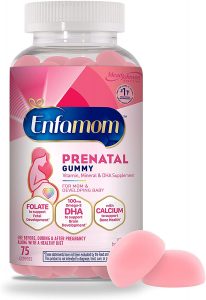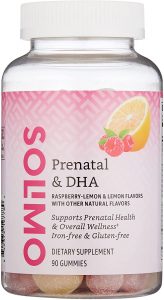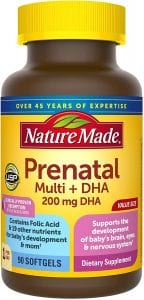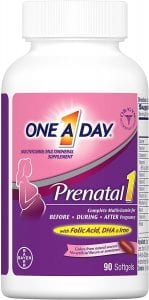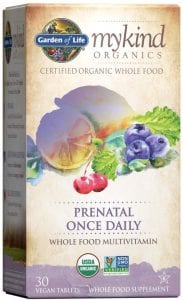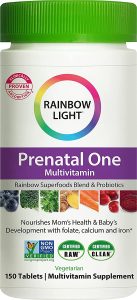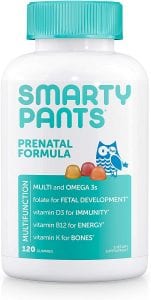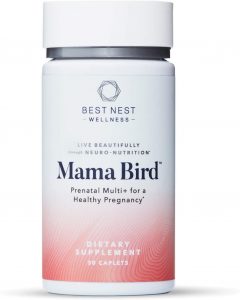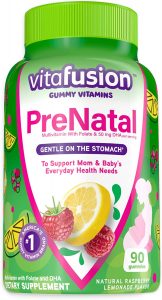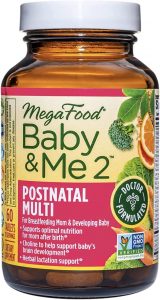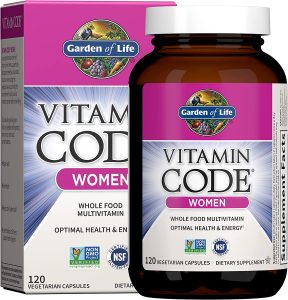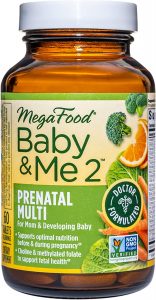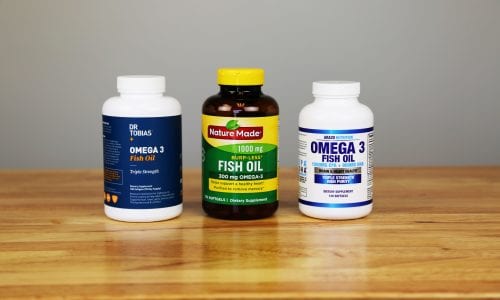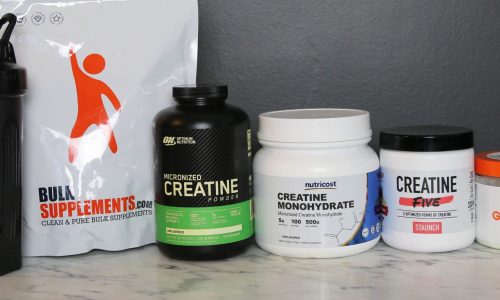The Best Prenatal Vitamin
We looked at the top 12 Pre-natal Vitamins and dug through the reviews from 59 of the most popular review sites including and more. The result is a ranking of the best Pre-natal Vitamins .

Our Review Process
Don't Waste Your Money is focused on helping you make the best purchasing decision. Our team of experts spends hundreds of hours analyzing, testing, and researching products so you don't have to. Learn more.
Our Picks For The Top Pre-natal Vitamins
- 1. Enfamom Gluten Free Gummy Prenatal Vitamin, 75-Count
- 2. Solimo Iron-Free Fruity Prenatal Vitamin, 90-Count
- 3. Nature Made Once Daily DHA Prenatal Vitamin, 90-Count
- 4. One A Day Omega 3 Fish Oil Prenatal Vitamin, 90-Count
- 5. Garden Of Life mykind Organic Non-GMO & Kosher Prenatal Vitamin, 30-Count
- 6. Rainbow Light Certified Raw Prenatal Vitamin, 150-Count
- 7. SmartyPants Healthy Bones Prenatal Vitamin, 120-Count
- 8. Best Nest Wellness Mama Bird Energizing Prenatal Vitamin, 30-Count
- 9. Vitafusion Prenatal Plant-Based Gummy Vitamins, 90-Count
- 10. MegaFood Baby & Me Doctor Formulated Prenatal Vitamin, 60-Count
- 11. Garden of Life Vitamin Code Heart Health Prenatal Vitamin, 120-Count
- 12. MegaFood Baby & Me 2 Breastfeeding Prenatal Vitamin, 60-Count
This prenatal vitamin is gluten-free and gentle on the stomach. It's a flavorful gummy that you'll actually want to take, verses a large pill that is hard to swallow. You'll find this formula is loaded with calcium, folate and omega-3 DHA, all of which are important in the development of your little one.
Pleasant TasteYou won't find any artificial sweeteners, sugar or high fructose corn syrup in these prenatal vitamins.
If you aren't a fan of swallowing pills, this prenatal vitamin is your best bet. It's a gummy supplement with DHA to help support a healthy pregnancy. The gummies have a pleasant raspberry lemon flavor, so you'll look forward to taking them each morning.
Easy to ChewThis prenatal vitamin bottle offers a 45 day supply.
Taking a daily prenatal vitamin is an excellent way to provide the nutrients a growing baby needs. This prenatal vitamin comes in a softgel that is easy to swallow. The formula is free of artificial flavors and contains folic acid, iron and DHA.
Gluten-Free FormulaThis prenatal vitamin is free of any artificial flavors and is safe for women who are gluten intolerant.
You'll find this prenatal vitamin provides the nutritional support your growing baby needs. It has essential ingredients, like iron, folic acid, vitamin D, calcium and DHA. It's gluten and dairy free and doesn't contain any artificial sweeteners or flavors.
Complete Multivitamin for PregnancyWhether you're trying to conceive, have already conceived or are nursing a newborn, this prenatal vitamin will supply you with the nutrients you need.
Buying Guide
Trying to conceive or perhaps you have already been blessed with a growing baby inside? Now is the time to consider taking a prenatal vitamin for healthy growth and development of baby and yourself. Pregnancy can be tough on your body, and in addition, there are quite a few nutrients that a growing baby needs to sustain itself in the womb. More than sustenance, prenatal vitamins have been proven to prevent some abnormalities in thriving babies and aid in a healthy birth weight. There are a few key vitamins and supplements that can be found in the best prenatal vitamins. Let’s investigate what makes a prenatal vitamin the best.
Perhaps one of the most important ingredients in modern prenatal vitamins is folic acid. Medical research has shown that neural tube defects in a baby, including brain and spinal cord defects, can be prevented by increasing folic acid intake during pregnancy. This is a supplement you’ll find in most prenatal vitamins today.
Another common supplement in prenatal vitamins is iron. This is key in preventing anemia in both the baby and the mother. Anemia is when the blood is deficient of red blood cells, and when there is an increase of iron intake, the red blood cells become sturdier. Anemia is not uncommon in pregnancy and will show up in the initial blood draw in pregnancy most of the time. However, if you do not address anemia when pregnant, it can affect the baby’s iron levels as well and leave them anemic.
For the third trimester specifically, you will want to be conscientious of the calcium and vitamin D in your prenatal vitamins. These two are especially important those last few months because that is when the baby’s bones and teeth are growing at an accelerated pace. In addition to taking those prenatal vitamins religiously, it’s important to maintain any fevers that you contract. Fevers have been shown to cause tooth bud decay among other dangers to baby. Keeping fevers at a safe temperature with doctor prescribed methods will help to keep baby safe.
Healthy brain development in the baby during pregnancy is an important factor to remember when choosing a prenatal vitamin. Omega-3 fatty acid supplements are the suggested nutrient to achieve good brain health. They are usually found in prenatal vitamins for easiest consumption. However, you may not need a high dosage in your vitamins if you are very conscious of your diet and include things such as fish, flaxseeds, Brussels sprouts and avocados frequently.
“If you’re vegan or allergic to fish, talk to your doctor about other ways to meet your DHA/Omega-3 fatty acid needs during pregnancy,” says our resident expert Jessica Cording, a registered dietitian and health coach. “For example, there are algae-based DHA supplements available.”
To keep the mother’s immune system in good fighting condition, prenatal vitamins are often loaded with Vitamin C, Vitamin A and Vitamin E, as well as zinc and copper, to help support the stressed immunity. In combination with the other supplements mentioned above, these vitamins can be absorbed into the body and greatly aid in a healthy baby and mother.
Now, you may be wondering when the best time is to start taking prenatal vitamins. “The best time to start taking a prenatal vitamin is before you conceive. A lot of important fetal development occurs very early, before many women even know they’re pregnant,” says Cording. This is ideal because the very first things to develop in that first month are the neural tube, which includes the brain and the spinal cord.
“If you haven’t started taking a prenatal vitamin by the time you find out you’re pregnant, don’t freak out — just start taking it,” adds Cording. “Some doctors may also recommend continuing to take the prenatal vitamin while you breastfeed to account for increased maternal nutrient needs during lactation.”
Sometimes you may find a few unfavorable side effects from the prenatal vitamins. In combination with fluctuating hormone levels and changes in nutrient necessities, prenatal vitamins may cause nausea. If you experience this, try taking them at different times throughout the day. Doctors also recommend trying a gummy prenatal vitamin. This may help with the side effect of nausea.
Another suggestion to avoid negative side effects from the vitamins is to choose one that has raw whole foods and enzymes or probiotics. Whole foods tend to be a bit gentler on the stomach, and the enzymes really aid in digestion throughout the entire GI tract.
In addition to side effects, you will want to find a once a day prenatal vitamin. Remembering to take vitamins three or four times a day is tough, especially since your brain can be a little foggy during pregnancy. Once-a-day vitamins also help if your prenatal vitamin doesn’t sit well with you. A slight stomach ache once a day is more manageable than repetitive nausea throughout the day when you have a multi-dosage prenatal vitamin.
As you enter into the adventure of motherhood, remember to keep yourself and baby healthy. Prenatal vitamins are a great way to give the baby the nutrients it needs while keeping your immune system in tip-top shape. Also, there is no wrong or right prenatal vitamin, so don’t be afraid to switch around if you feel negative side effects from one. Consult with your OBGYN to help find the right one for you (related: OBGYN Columbus, Ohio).
Our Expert Consultant

Registered dietitian and health coach
Jessica Cording, MS, RD, CDN, INHC is a registered dietitian, health coach and writer. Through her writing, consulting, public speaking, and counseling, she works with individuals, corporations, and the media to help make drama-free healthy living approachable and enjoyable. She is a part of the mindbodygreen Collective and author of “The Little Book of Game-Changers: 50 Healthy Habits For Managing Stress & Anxiety” (Viva Editions). She also creates guided meditations for Simple Habit.
Why we recommend these pre-natal vitamins ?
Products Considered
Products Analyzed
Expert Reviews Included
User Opinions Analyzed
Our experts reviewed the top 12 Pre-natal Vitamins and also dug through the reviews from 59 of the most popular review sites including and more. The result is a ranking of the best of the best Pre-natal Vitamins .
DWYM is your trusted roduct review source. Our team reviews thousands of product reviews from the trusted top experts and combines them into one easy-to-understand score. Learn more.
The Best Bang For Your Buck
Solimo Iron-Free Fruity Prenatal Vitamin, 90-Count
Key Takeawy
If you aren't a fan of swallowing pills, this prenatal vitamin is your best bet. It's a gummy supplement with DHA to help support a healthy pregnancy. The gummies have a pleasant raspberry lemon flavor, so you'll look forward to taking them each morning.
What to Look For
- Start taking prenatal vitamins before conceiving. Continue taking prenatal (or post-natal) vitamins after delivering the baby.
- Prenatal vitamins can be found over the counter at most drug stores.
- Make sure you’re buying a quality supplement when you buy an over-the-counter prenatal vitamin. “You want to purchase something that has been tested by a third party to ensure the product meets high standards,” says registered dietitian Jessica Cording. “A few examples are Consumer Labs, NSF International and United States Pharmacopeia (USP).”
- A calcium supplement may be taken in addition to a prenatal vitamin to reach the recommended dosage.
- Vegetarians or special diet patients should be aware of any of the essential nutrients that are missing from their dietary restrictions.
- Taking prenatal vitamins should be a supplement to a healthy and complete diet, not a substitute.
- Setting a reminder on your phone to help you remember to take the prenatal vitamins is also highly recommended.
- You will want to store prenatal vitamins as directed on the packaging. Most of them call for a cool, dry place like other vitamins.
- Since prenatal vitamin containers come in all sizes with different dosage recommendations, it would be a good idea to mark a refill date on your calendar to help you order or pick them up before you run out.
- If your doctor recommends taking any additional supplements or vitamins on top of your prenatal vitamins, it may be a good idea to get a daily pill container so you know when and which pills you have taken each day.
- As with all medicine and vitamins, keep prenatal vitamins out of reach of children and pets.
- Should any prenatal vitamins accidentally be ingested by a child or pet, the poison control number is 1-800-222-1222.
- Prenatal vitamins tend to be large pills, commonly referred to as horse pills. If they are too big for you to swallow, try crushing them and adding them to yogurt or a drink for easier consumption.
More to Explore
Prenatal vitamins are not all created the same. One mother may need more iron in her prenatal vitamin than another, or perhaps a vegetarian needs a little boost in omegas. In addition to that, not every pregnancy is the same for a mother. This is why it is important to talk to an OBGYN and find the best prenatal vitamin for you and baby during your pregnancy.
The 1990s brought about the inquiry of nutrition and how it interacts with reproductive science. Britain introduced the prenatal vitamin in the late 20th century, and other countries quickly followed suit after studying the benefits. These early supplements contained folic acid to prevent neural tube defects and give the mother a boost to support a pregnancy, which can be taxing on her body.

